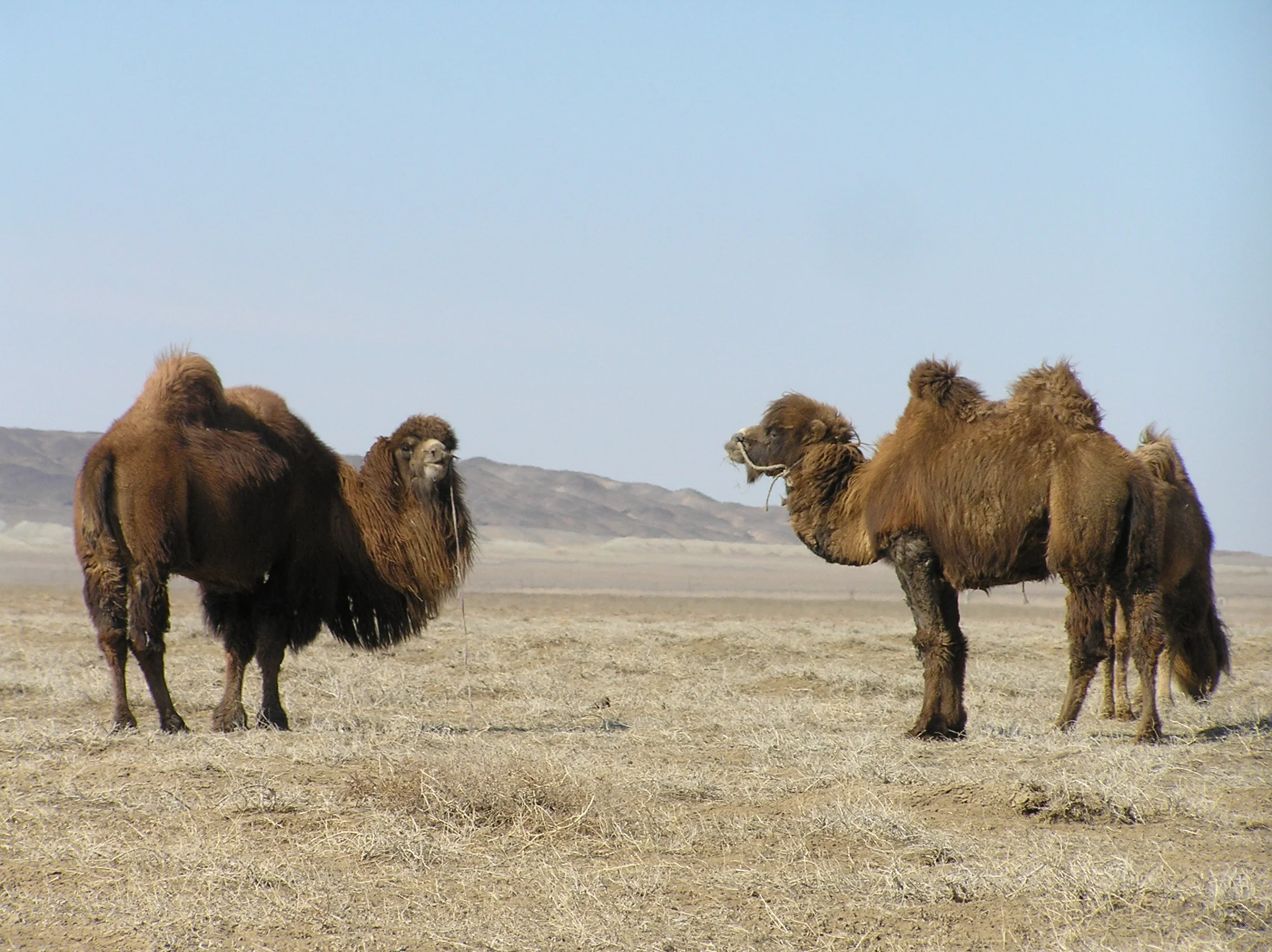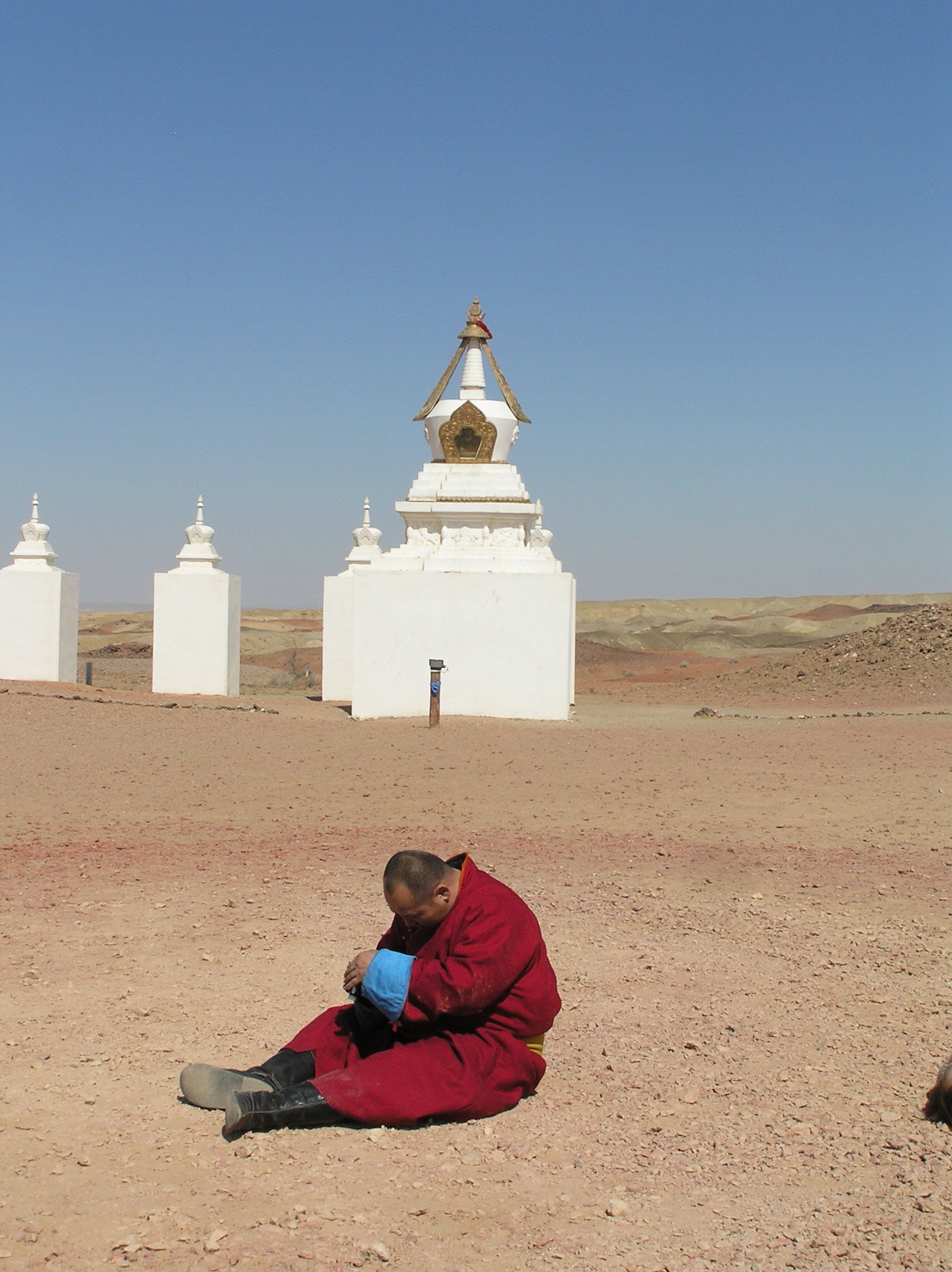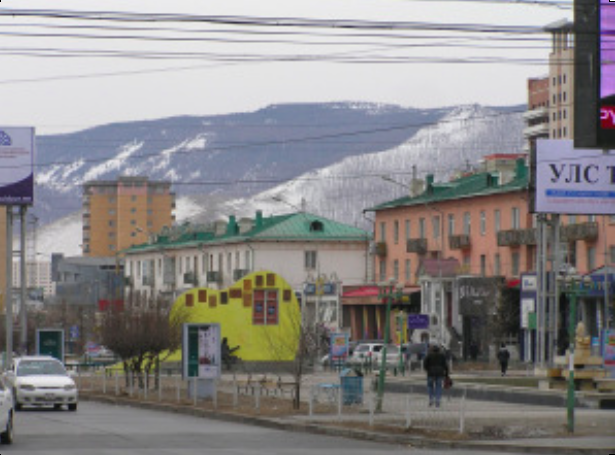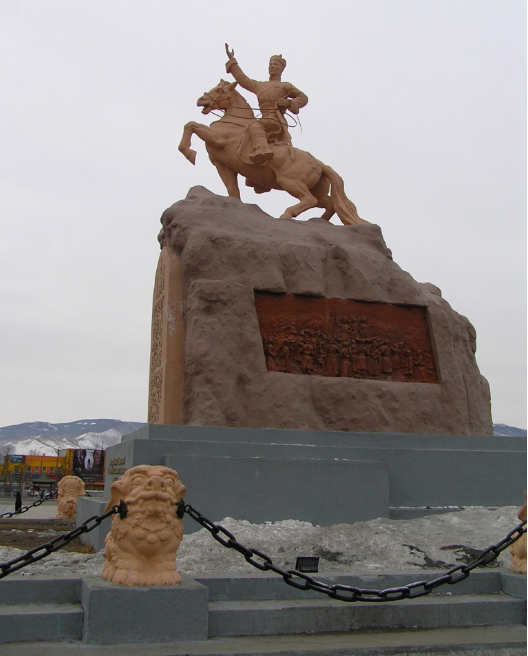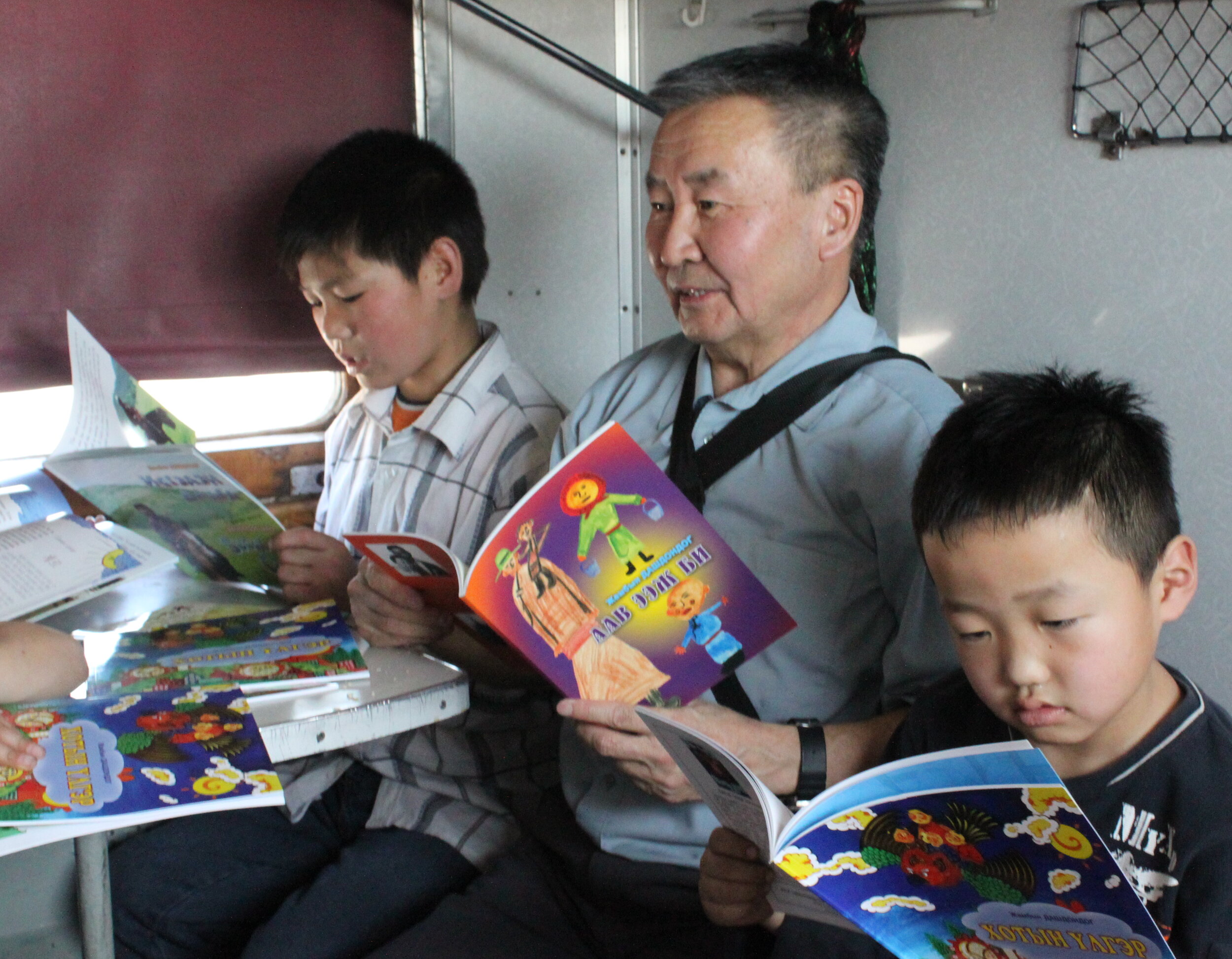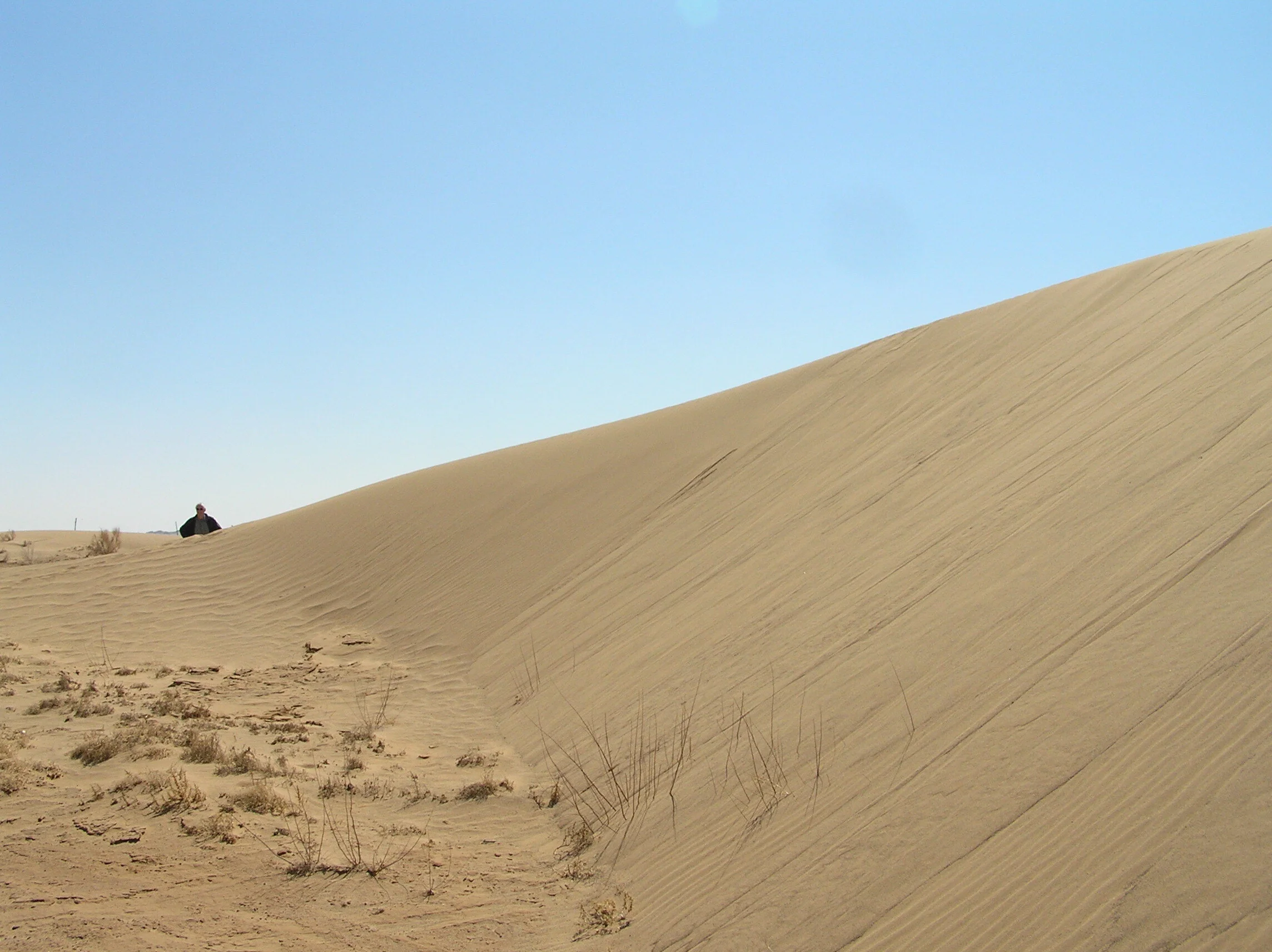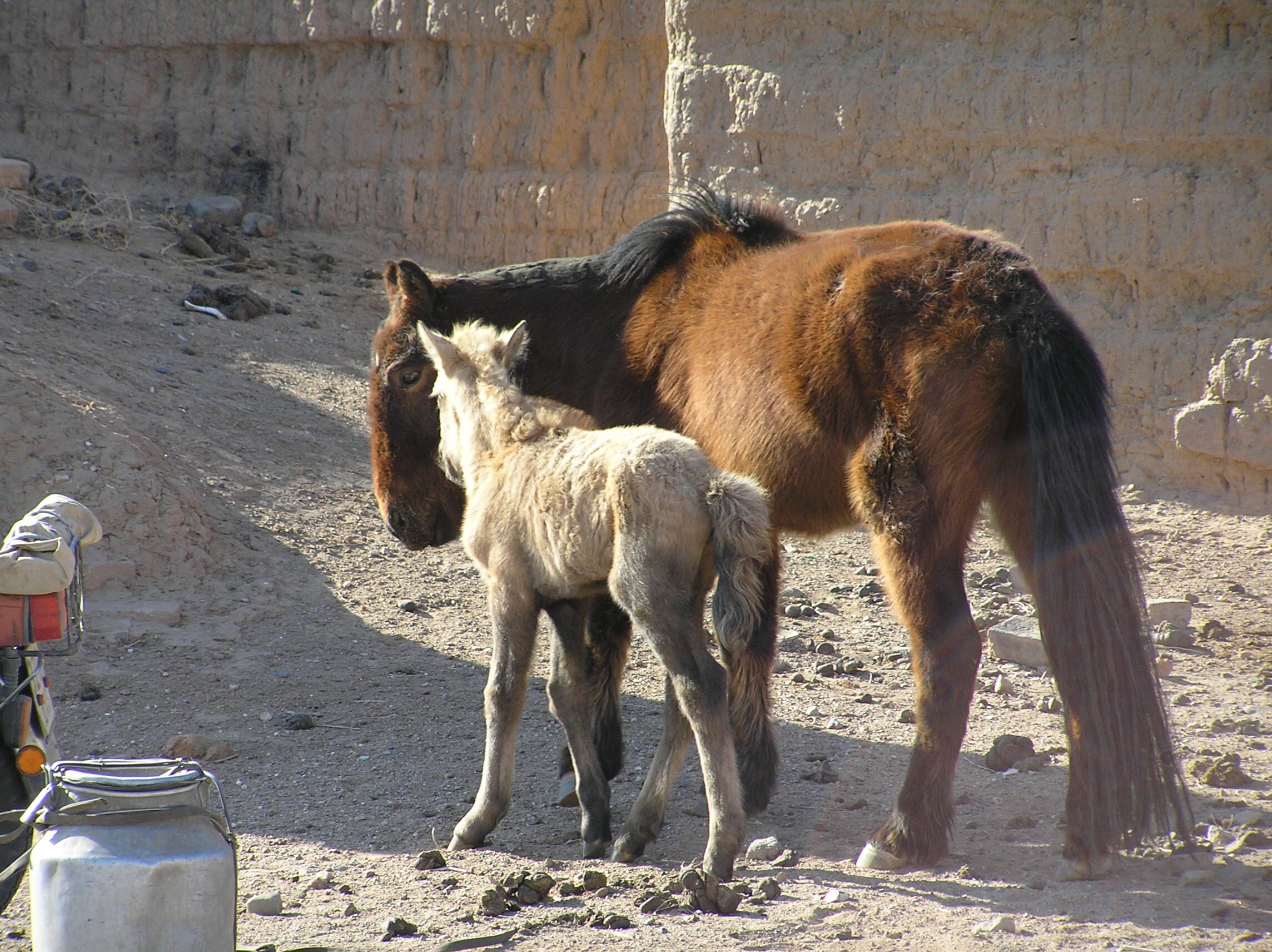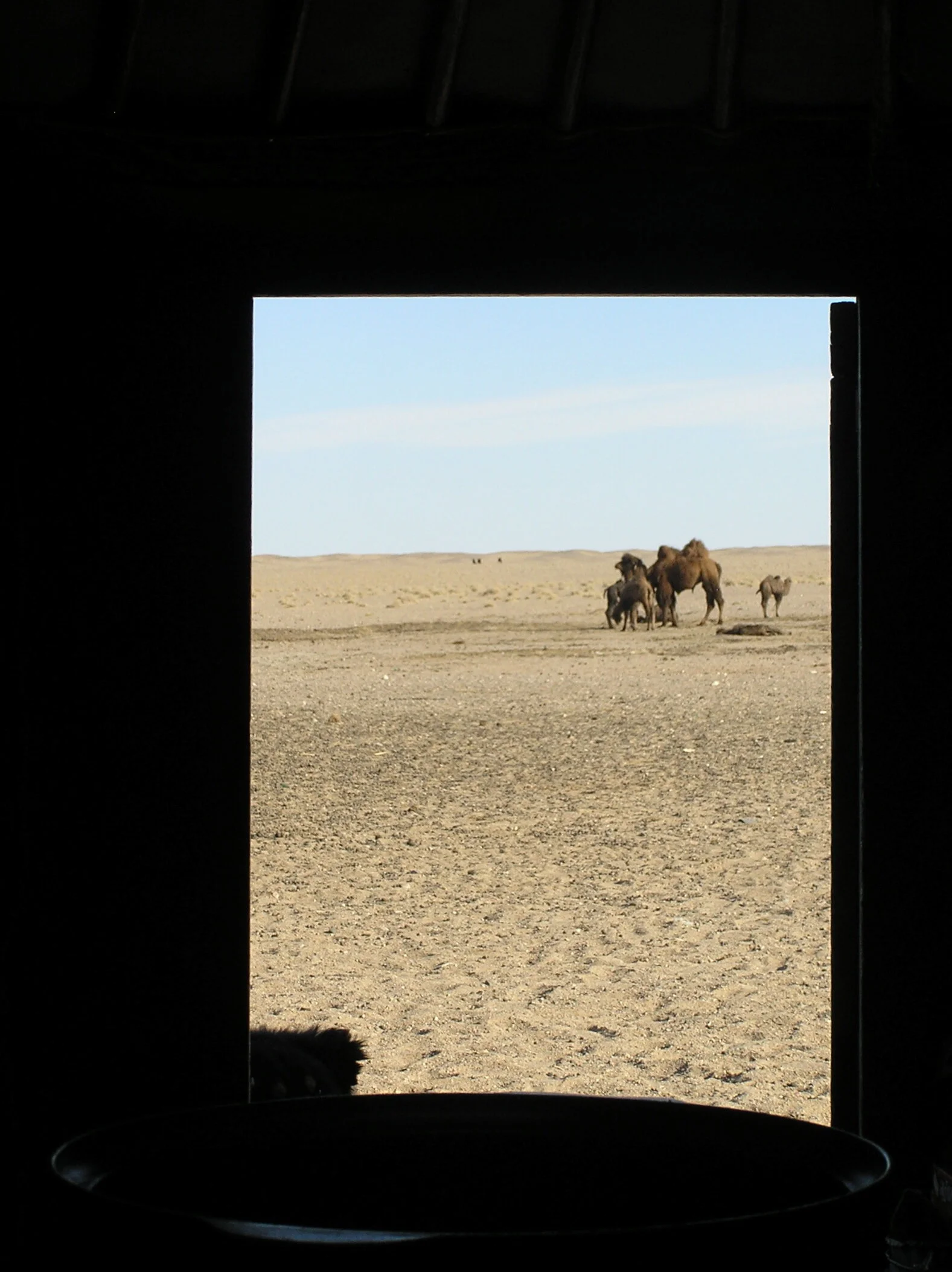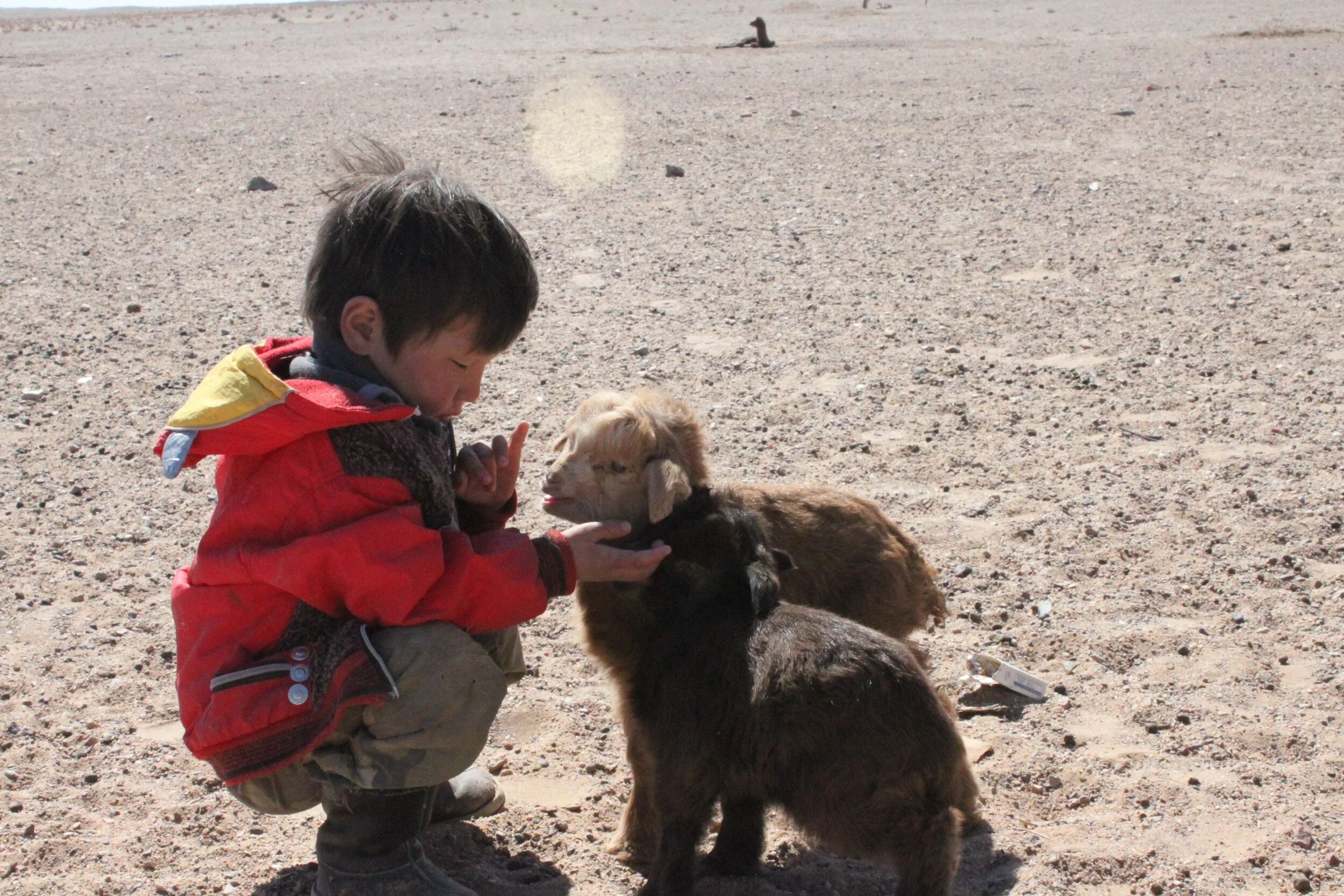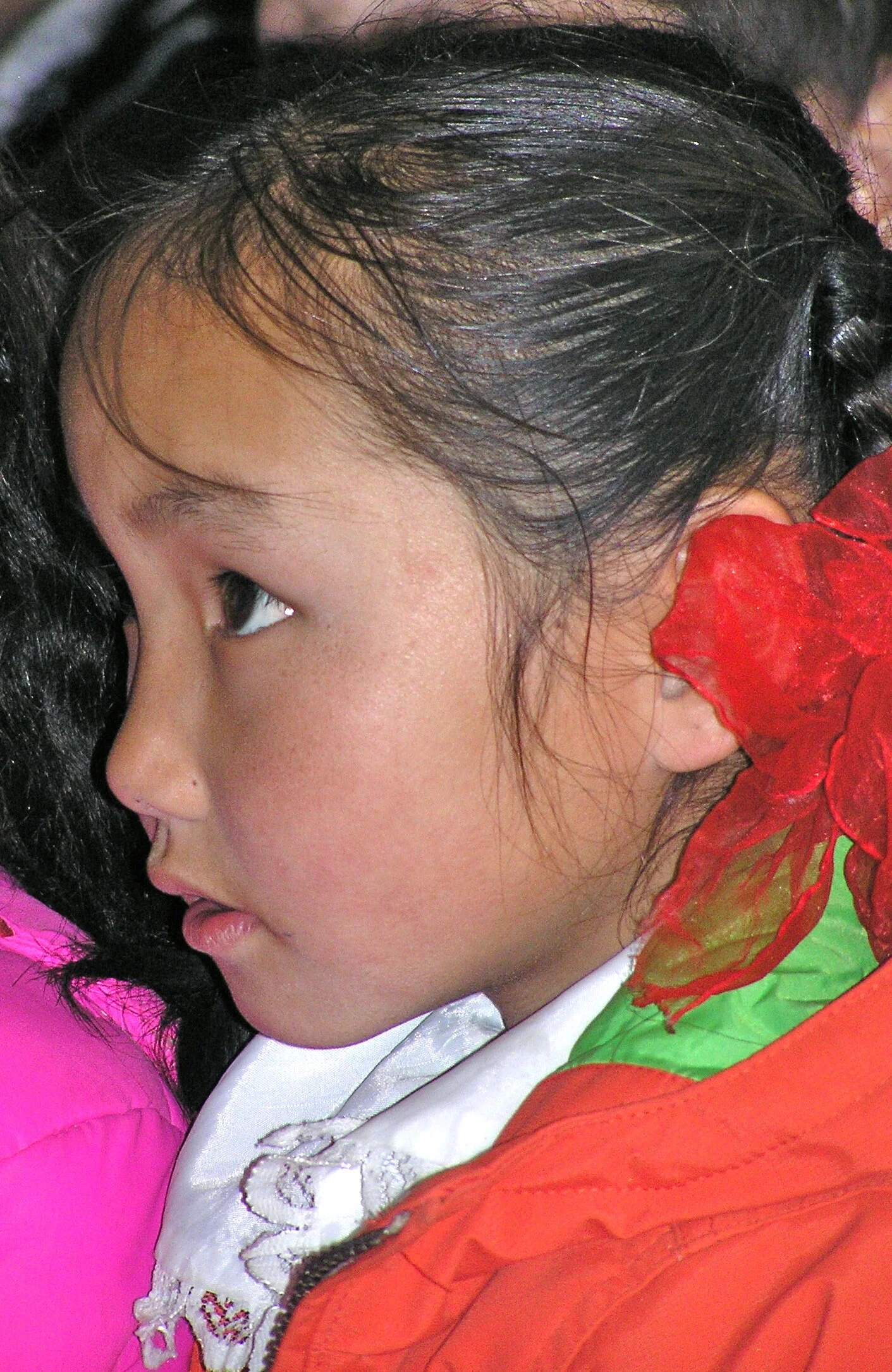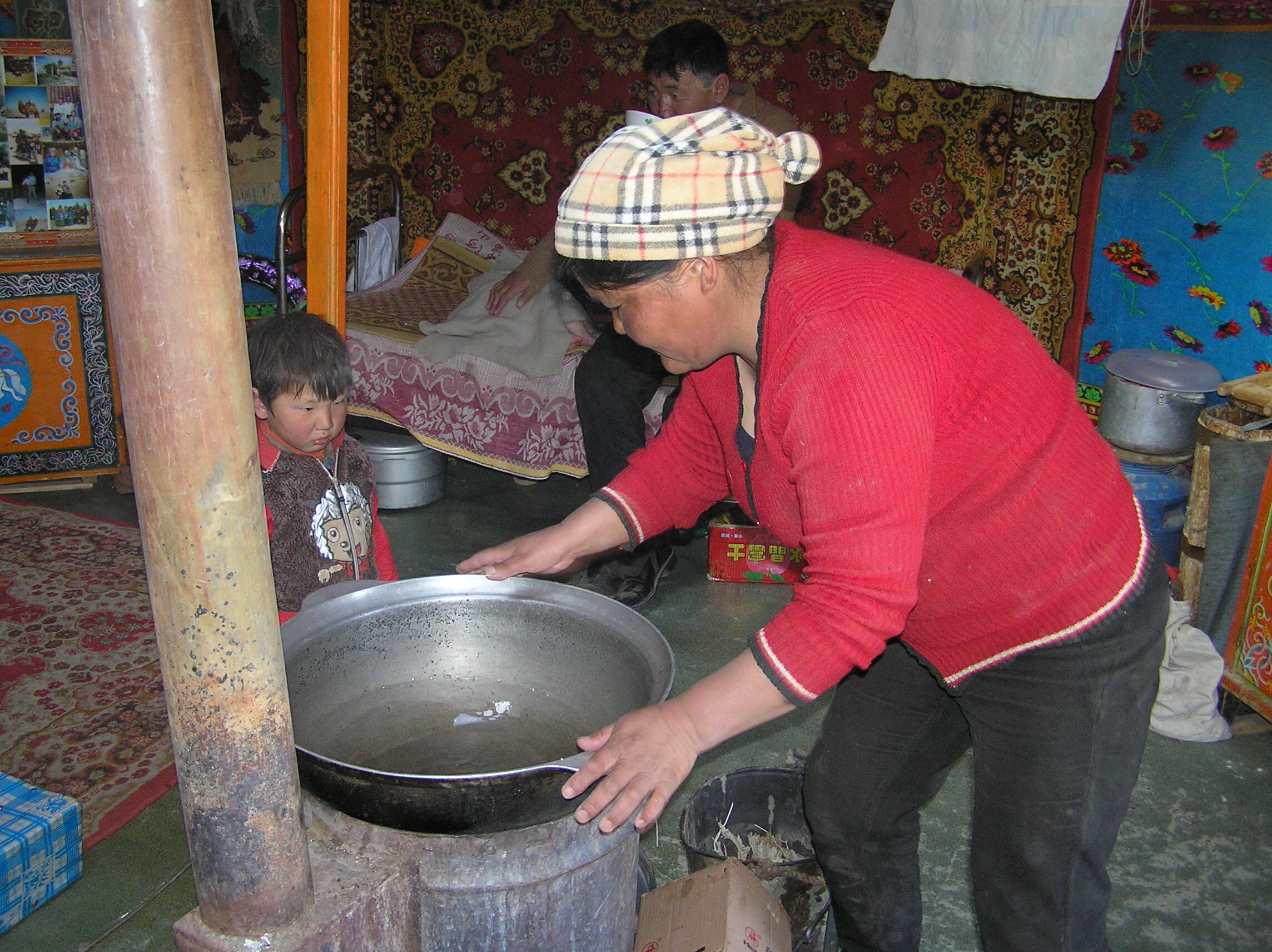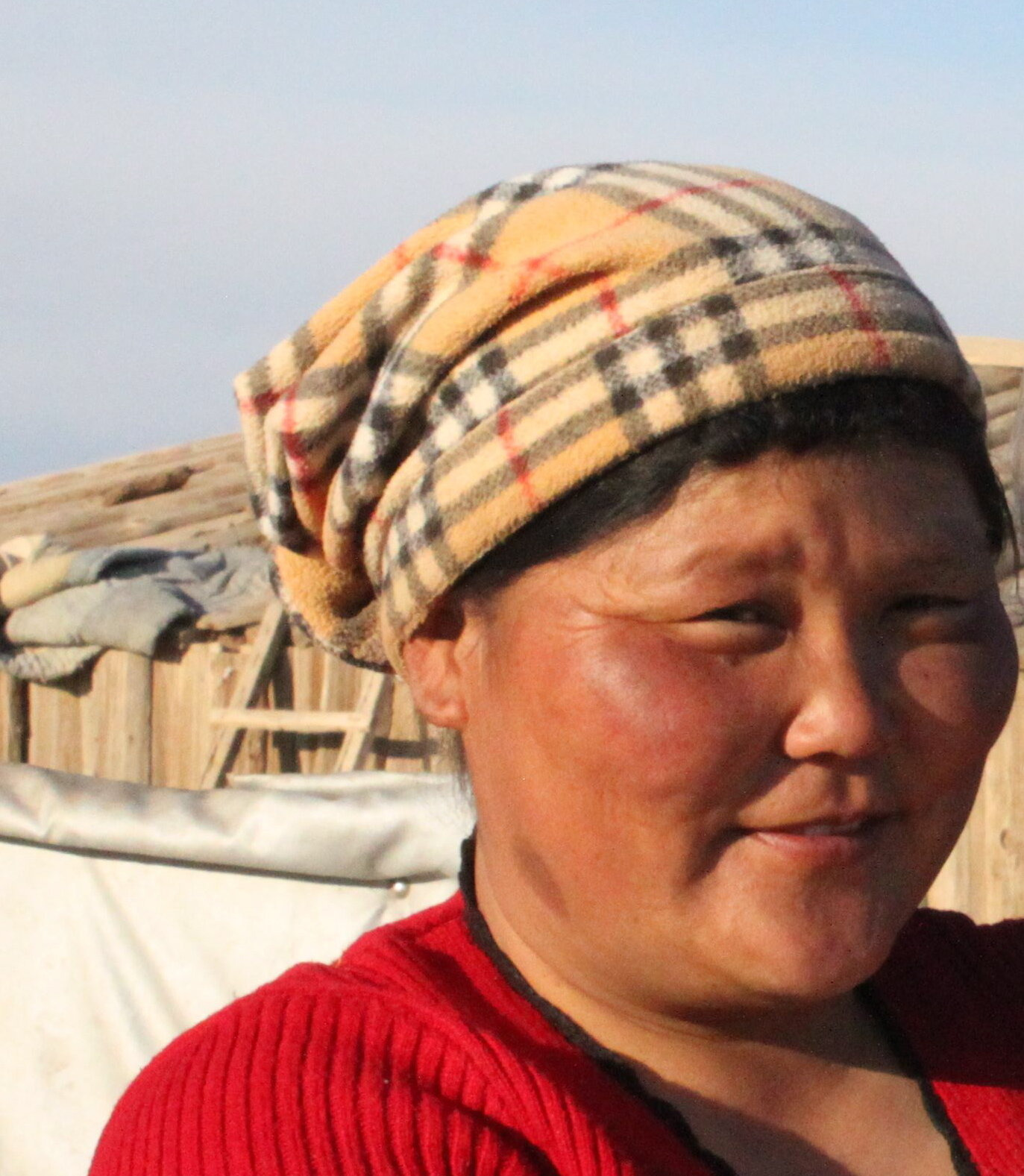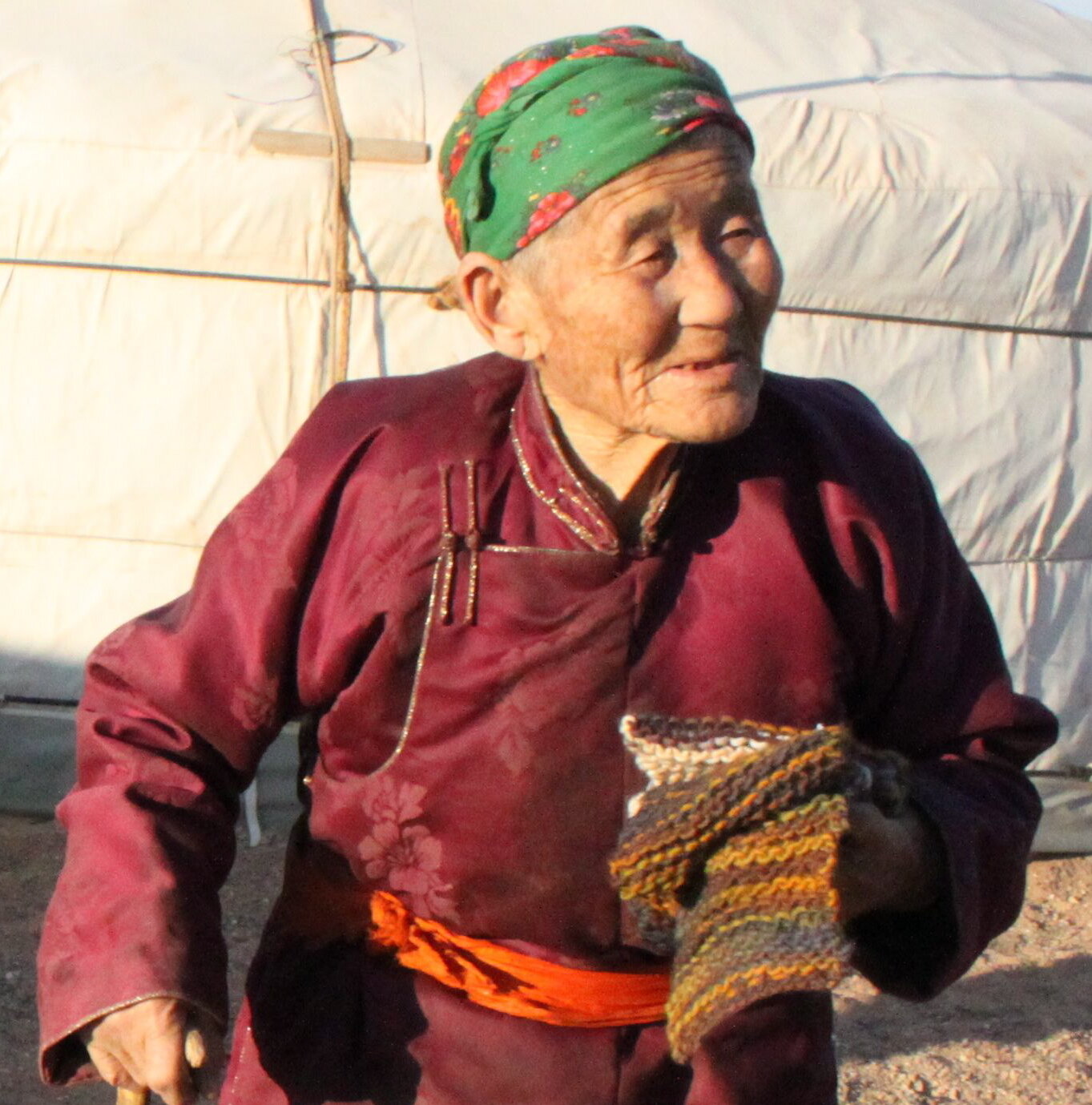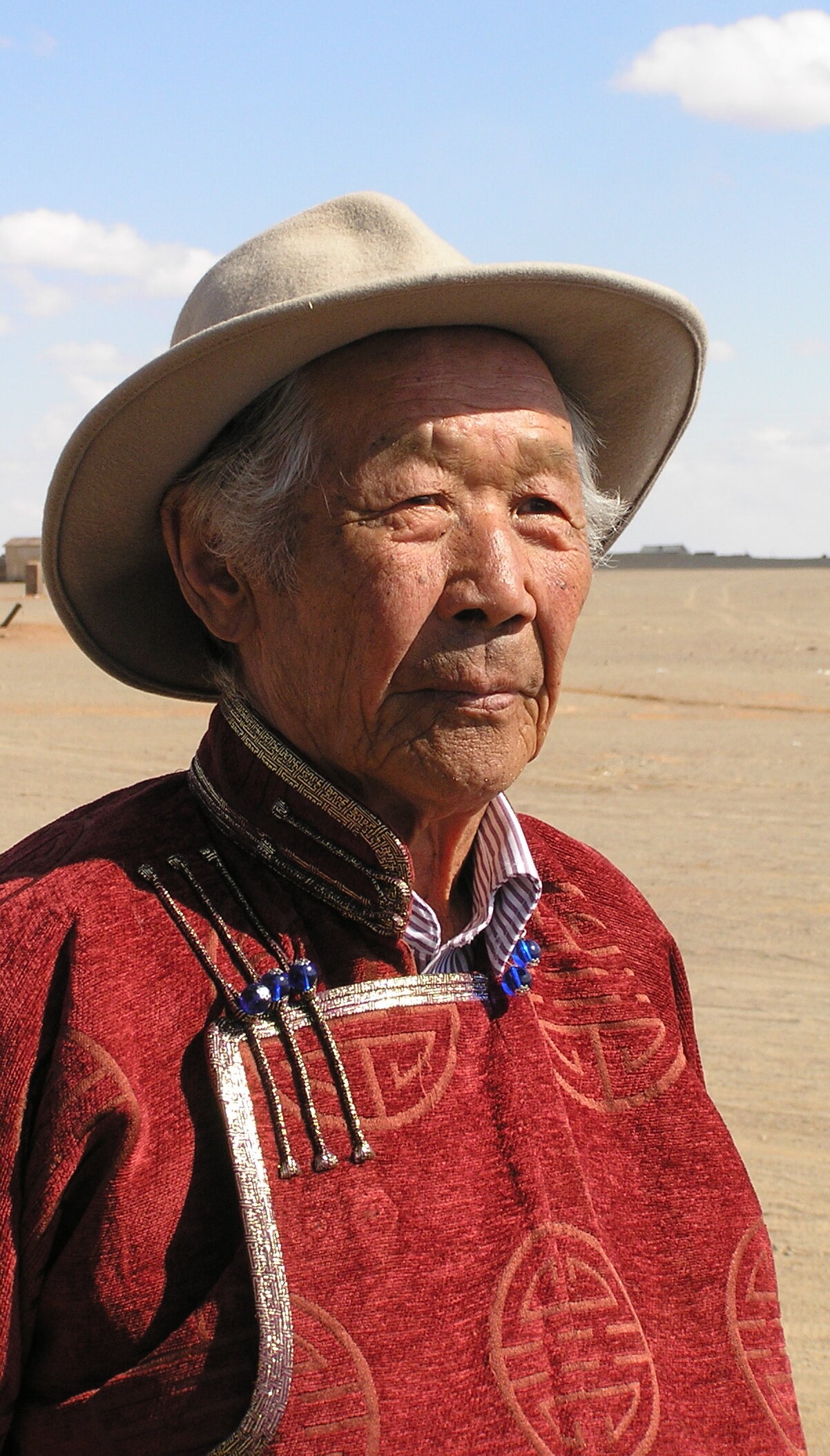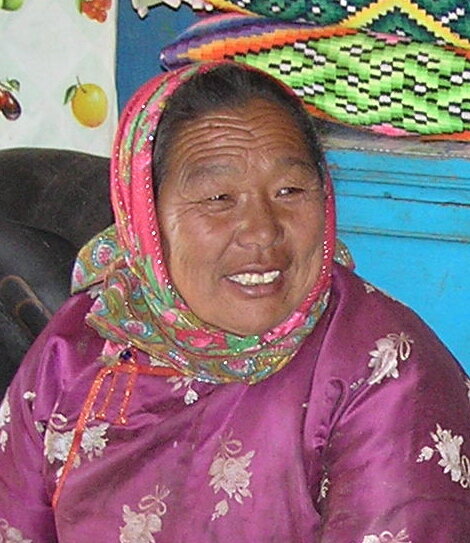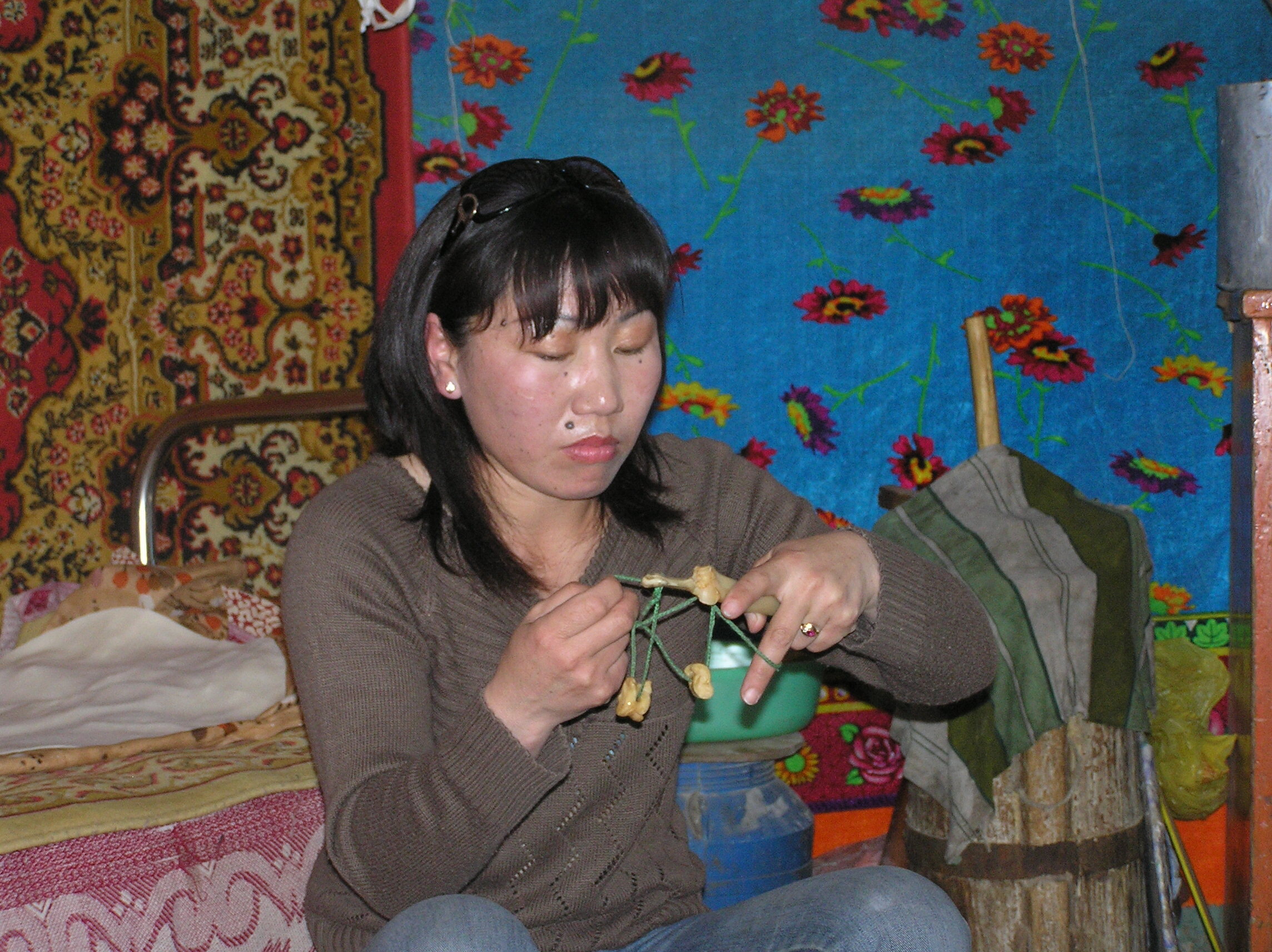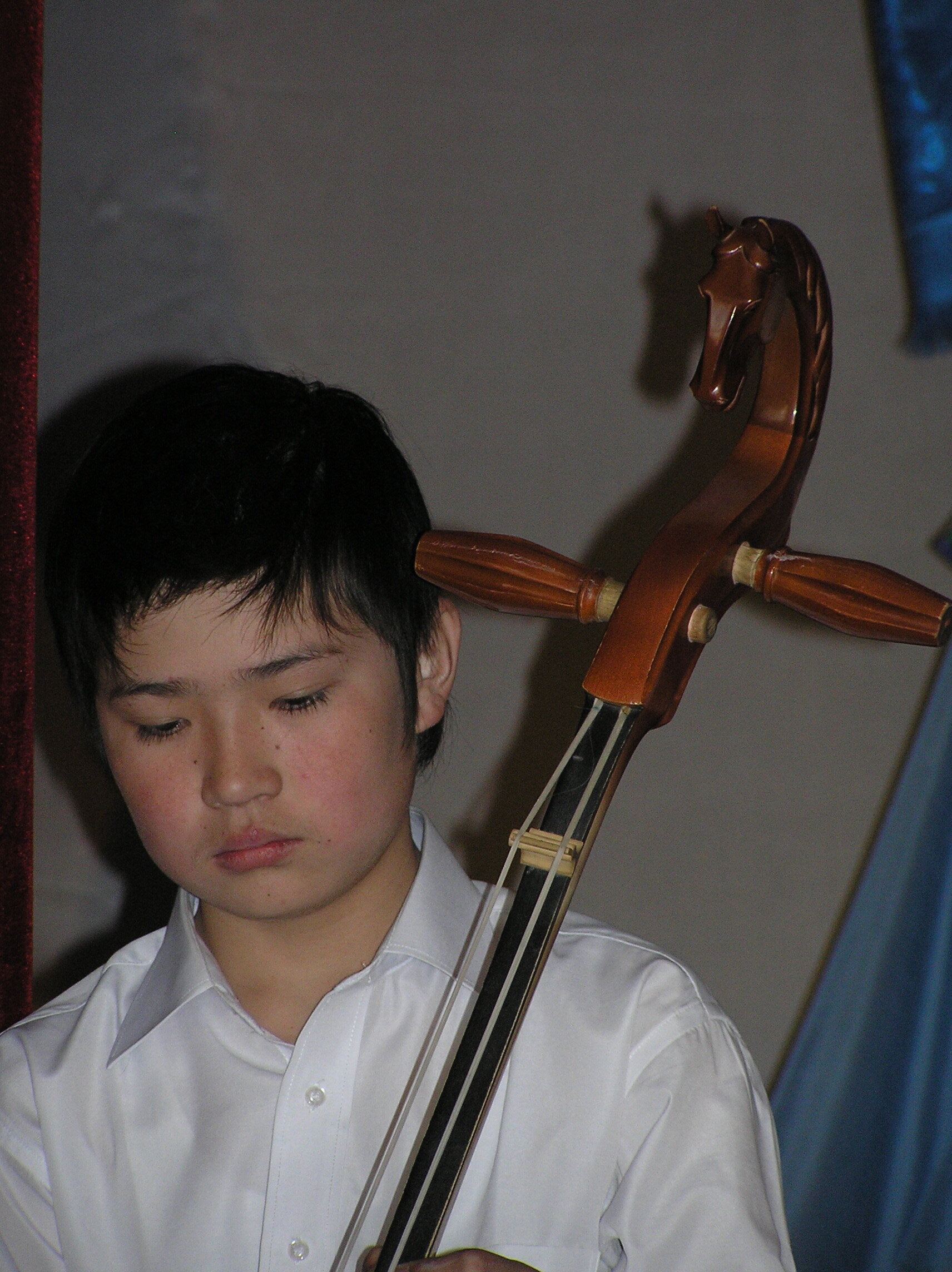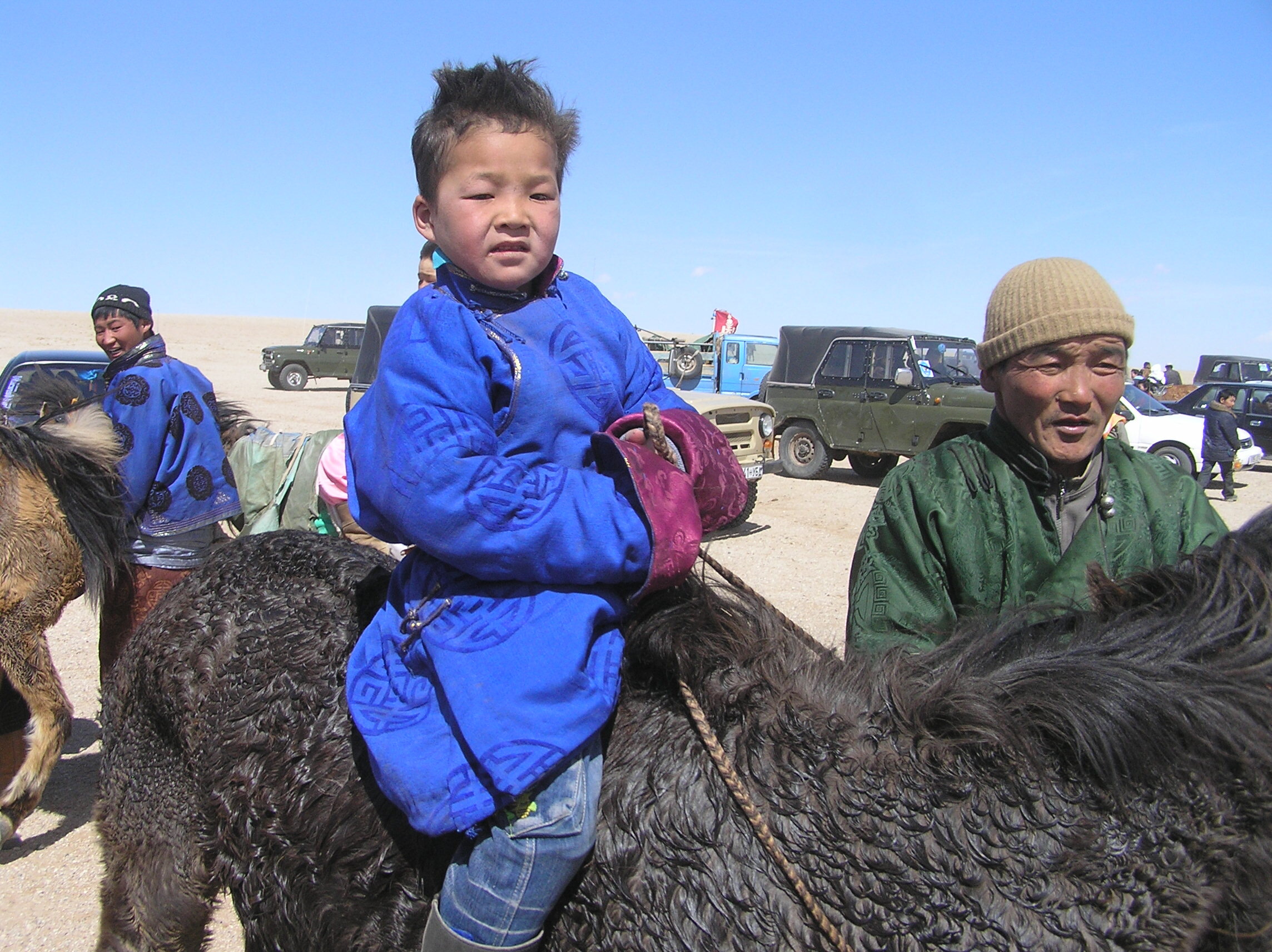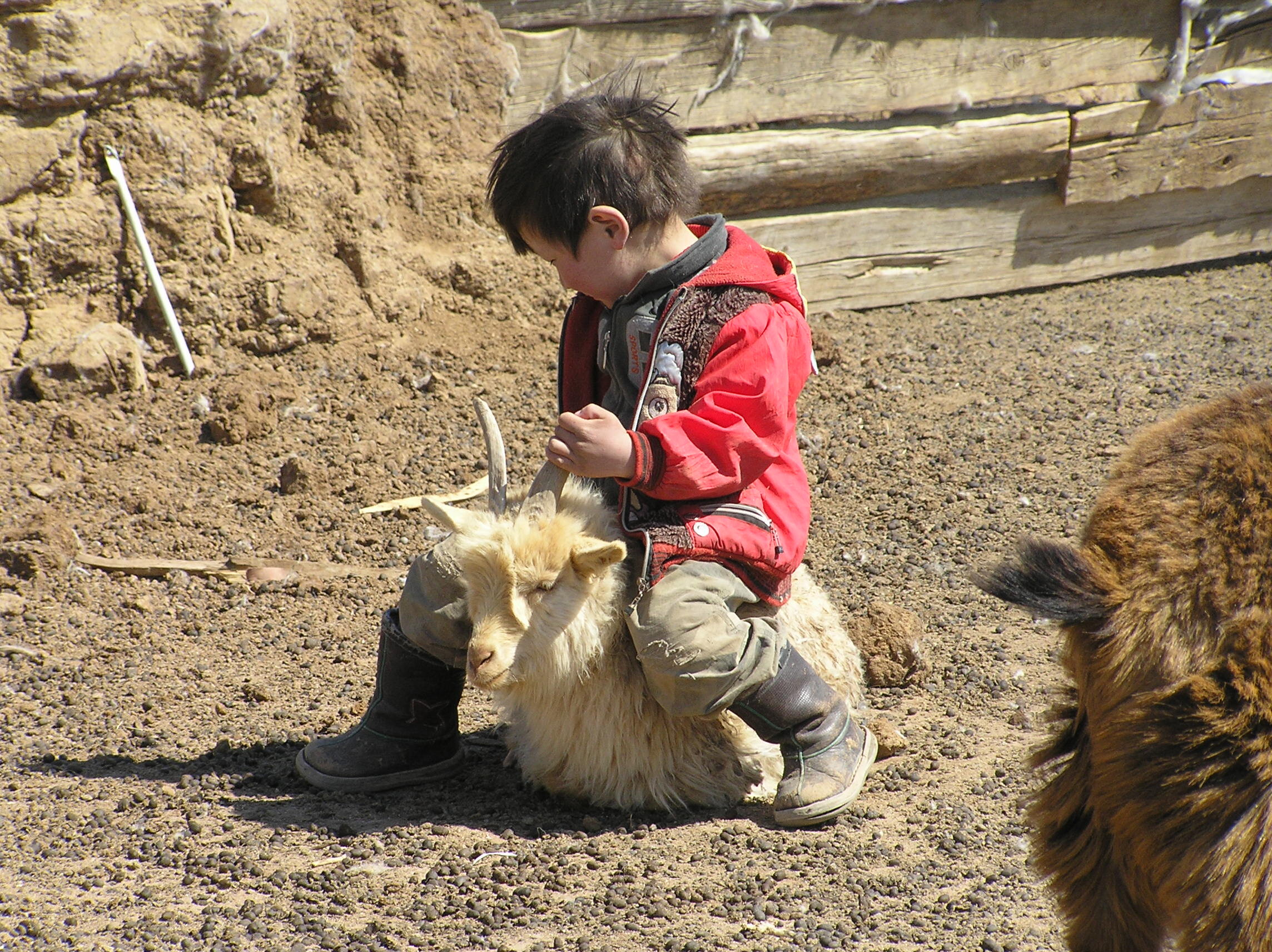Dashdondog in traditional outfit.
When I was doing the research for my book My Librarian is a Camel, about how children get library books around the world when there are no library buildings, I made contact with Dashdondog. Dashdondog was an amazing Mongolian writer of over 100 books, poems, stories, and songs for children. He told me about his mobile library. He helped preserve language and culture, was even jailed under Russian rule for writing stories… He was a gentle, caring man who knew the value of the joy and wisdom of books. His unique mobile library brought books to children across the Gobi Desert, using vans, a bus and camels. He provided me with information and photos to use in my book. Ultimately, he was awarded the prestigious Asahi Reading Award (IBBY) for his mobile library services. I met Dashdondog in person at an IBBY Congress in China. When we parted, he said “You. Com. Mongolia.”
I thought ‘Yes, I’d love to come to Mongolia but how do you just go there? Not much later I received an invitation from an international school in Ulaanbaatar, Mongolia! I was thrilled. As I flew in over Ulaanbaatar, I was reminded to Nunavut. Wind blown valleys, not much vegetation and old buildings. My first impression was “deserted Russian town.” Policemen in fur hats, friendly smiles, language that sounds Russian, and ancient helicopters at the airport. Steaming power plants provide heat for the city. Mongolia has only been out of communist rulership since the ‘90’s. What a contrast with the gleaming steel and glass of Singapore where I just came from. Here broken apartment buildings look forlorn. Road pavement is cracked and dusty. People drive like madmen. 30% unemployment leads to poverty. Later, when I take a taxi back to the airport to pick up Kees, the taxi driver proudly tells me that his son is a throat singer in Paris.
Dashdondog regularly visits nomad families living in gers (pronounced as in ‘Gary’; yurt is the Russian word for these round, white tents) as well as schools in remote villages. He performs his poems, sings songs, reads books and leaves behind many volumes for the children. Until I arrived in Mongolia I had no idea how famous he is in his country. Take Robert Munsch, Roald Dahl and Raffi and roll them into one. Then you will get close to the popularity of Dashdondog. I discovered that every child, and indeed every adult, in Mongolia can instantly recite his poetry and sing the songs he composed. Many of them don’t even realize that these are texts that he wrote, they know them as their own national treasures. I don’t speak a word of Mongolian and Dashdondog did not speak much English. But when he performed a poem about horses galloping across the steppe, I could picture what he was saying, imagine their hooves and the dust based on the rhythm of his words.
He invited us to stay with him in Ulaanbaatar, the capital city of Mongolia. The walls of his living room were hung with photos of IBBY (International Board of Books for Young People) friends from around the world: Astrid Lindgren, Katherine Paterson, Uri Orlev and many others. He and his wife, a paediatrician, prepare us traditional dinner of boosh: dumplings with meat inside, and vegetable stir fry with meat and rice. Along with shaved pickled cabbage, tomatoes and cucumber. And whisky! The Russians left their legacy here when they left in 1990 after 70 years of occupation. When I ask for water they think I ask for vodka! Dashdondog promises that he will take took us out into the Gobi after my days at the international school. The students have knitted warm scarves for nomad children. I take these, along with many books, on my adventure into the Gobi.
Before leaving for the Gobi, we roam the streets of Ulaanbaatar, walk in and out of many shops and sample local foods. Bought camel hair felt booties for our grandson and a traditional felted fox to hang over his bed. When a child whimpers in his sleep and frowns, the fox will tell him ‘Your mother is away for a little while’, then the child will ‘smile’ in his sleep when the fox says ‘I am here and will play with you.’ How lovely when gifts come with stories.
When it snowed, there were no snowploughs… Sidewalks had treacherous holes or manhole covers missing. Many buildings had long cracks in their concrete walls. It was obvious that the Soviet regime had not spent much money on upkeep before they left Mongolia to its own devices.
We visit the National Museum where we get a private English speaking guide who tells enthusiastically about the long and violent history of Mongolia. We wander through at least ten halls showing artifacts from prehistoric times right up to recent times when Mongolia finally became independent. Ghengis Khan is revered with large statues and his name attached to just about everything. The museum displays traditional costumes, a ger, and many other interesting objects.
Next we walk to a teachers’ college, the oldest in Mongolia. We are received by the director in a gorgeous office. Mongolians are the most hospitable people: they immediately serve tea and coffee and candies. Then we are escorted to a large hall where some sixty teachers of English have gathered for a lecture. Apparently from me. OK. Good thing I have my laptop with me because I had no idea this was about to happen. I give a talk about my books and then Dashdondog talks about his books. All teachers sing along with his songs and know his poems. Students perform a special traditional dance in gorgeous costumes. And, to my delight, I am presented with leather gloves, made in Mongolia.
I am also learning important cultural rules: if you step on someone’s foot, you better immediately shake hands. And don’t put anything on the floor, including your handbag. Once I know this rule I find it increasingly difficult not to throw my bag on the floor.
Dashdondog arranged our trip into the Gobi to bring books to children. The distances are mind blowing. For 12 hours we will travel by train and then continue for 12 more hours in a van, following sand tracks without any visible landmarks, deep into the desert. To our surprise, a translator comes along but, much of the time, she forgets to translate so we often have no idea what’s happening.
Train to the Gobi
When we reach the train station it starts to snow again. We have a compartment to ourselves: two benches with padding and a large woven rug on it. The train chugs along and the little Russian-looking stations in the snow, with icicles, make us feel like we were in the movie Dr. Zhivago. Several times we order hot water with tea bags. Dashdondog also brought beer.
In the train, Dashdondog pulls out a detailed itinerary which he has planned for each day for this visiting author from Canada. Talks, meetings, lunches, tours, talks in schools, and much more. He even planned a meeting with the state governor. He himself is obviously the country’s most famous writer. We spotted his books in stores. His books have been translated into many languages.
We have interesting discussions about books, writing, about his hero Hans Christian Anderson, and about politics, the Russians and the economy of Mongolia. At one point Dashdondog announces that he is going to “give books to children.” I toddle along. He walks several train cars down. Ours turned out to be luxury class. The other cars are crowded with people everywhere, no compartments, no rugs. He talks to the children, asks some people to leave their benches, gets all the kids to crowd together and then he starts to recite his poems. Faces light up all around as as they chanted along. They know his work everywhere. He sings, they all sing along. He reads some stories and hands out free copies of his picture books. Try that in North America an you’d get arrested. Here, Dashdondog spreads joy.
Books on the train
After several hours across the steppe we enter the Gobi. We drink to this fact as we watch a glowing red sunset, shortly before arriving in Shanshand, a desolate town of broken concrete buildings and sand sidewalks. Three guys from the Ministry of Education meet us and whisk us away in a van, then deliver us to the most horrendous place I have ever spend a night in. One narrow motel room with four skinny bunks, really just planks on legs. Someone came and spread a sheet on the bottom and gave us a dirty blanket. It was, of course, rock hard to lay on. It smelled terrible. Turned out there was only one bathroom in the entire building, with a tiny sink, for both men and women. No toilet paper. In the middle of the night the neighbors on the other side of the thin wall made very loud, unpleasant noises. None of us got any sleep and I pray we won’t have to stay there again when we return to this town.
The next morning we head off into the Gobi: our translator, Dashdondog, an official from the Ministry of Education and our driver - all in an old Russian van. Very soon after leaving town there is no more road. We simply follow a track across the sand, sometimes overblown with sand. I don’t know how the driver knows the way across the desert. There are no buildings, no trees. Sometimes he takes a right fork, we dive over hills and speed along incredible bumps - 150 KM of washboard. We all have to hang on for dear life, sometimes hitting our heads on the roof. I think my teeth have all jarred loose.
Suddenly, we stop at two large round mounds of rocks. Our translator explains that they represent two breasts. She and I, the two females, have to throw cups of milk onto these fertility mounds and walk clockwise along them while making wishes. I love these local customs.
Then we stop at the Energy Center, a place to pay tribute to the mountain. We enter through the left side of a meditation building “to leave our sins behind.” Then follow a path to some circles where the men line up with a view of the mountain and throw cups of vodka onto the ground. ‘What a waste’ I secretly think to myself. Next we put incense in a large burner, climb a large mound of rocks and tie blue silk scarves to the rocks. Our Mongolian friends pray by singing a long song which they tell us “restores the five senses.” This song was written by the famous Mongolian monk to whom this whole temple area pays tribute. The bright blue silk scarves dance in the wind.
Then we have to lay down on the ground to absorb the energy from the mountain. They explain that cell phones work here even though there are no satellite dishes. I do feel a bit of a tingle in my legs but that could also be contributed to the wild car ride. We continue to drive and drive and drive deeper into the blank void that is the Gobi - vast empty space with the odd dirt trail and, sometimes, large camel herds. I spot camel trains on the horizon. Once we see a fox, a few gazelles, a flock of cranes. Our Mongolian friends consider all of these sightings lucky, even the dead hedgehog along the track.
Finally we reach enormous sand dunes. Nothing but gently sloping brown sand, we truly are in the desert. I notice bones of dead horses, camel dung, and the fresh tracks of a fox. We spread a tarp on the sand and enjoy tea and deep fried ‘pancakes’ filled with meat. Soon, we load everything up to bump along the dirt tracks. Sometimes we come to a screeching halt by a large pile of rocks, all climb out of the van to throw more vodka on rocks and pay tribute to something. Much of it is over our heads, but we love the authentic experience of it all. The translator usually forgets to translate, or perhaps simply does not have the vocabulary to explain these customs to us.
Occasionally we come upon a lonely white ger. We stop to hand out scarves, books and candy for the children who lived here. In return the nomad families serve us tea with camel milk, fed us dried camel milk cheese curds and let us ride their camels.
We spot the remnants of an old temple, just sandstone walls, ruins. I ask to stop for photos and a good thing we did. As we round the corner, the desert scene turns into a wild west scene. Inside the remnant walls of the old temple, cowboys have herded many wild horses. The horses are corralled on one end, then stampede through the walled space to be captured by lasso. The cowboys try breaking the horses by tying a rope around their waist and riding it. They are branding the horses with irons held in a smoldering fire. A camel patiently waits, tied down to a heavy rock. The dust, the low sun, the stone walls make this an almost Biblical scene.
Ger with solar panel
Finally we arrive, in the middle of nowhere, at a ger. Suddenly there it is, facing nothing but space. Three gers close together, a type of barn, a few dogs and a herd of camels, including several baby camels. A small child runs out and the mother, with a round beaming face, invites us into her home. We know to step over, not on, the threshold and to always walk clockwise into the ger. We sit on painted stools and are served warm milk with tea, and a large bowl of what looks like dog biscuits but turned out to be brown chewy cookies and hard white pieces of cheese curd made from camel milk. The milk in the tea is also camel milk, in fact I got to milk the camel and she served the fresh milk.
From inside the ger
Then she saddles a camel for us to climb on and ride. You have to hang on for dear life when the camel gets back onto four legs but at least there’s lots of hair to cling to, easier than riding an elephant. The camels’ high pitch wine sounds like a haunting song floating over the desert. I pinch myself. Who knew writing kids’ books would lead to adventures such as this…
After more tea and gift exchanges of books, pencils and warm scarves sent by the international school, we are on our way again, stopping once more briefly at a ger where a 85 year old, bent woman and some children are thrilled to get warm scarves. We see many dead animals along the way who did not survive the last, harsh winter.
When we reached our destination, Khovsgols Soum, a forlorn windblown town bobbing on a sand ocean, we visit the local school and share books with children. They were incredibly keen. Mongolia may not be wealthy by western standards but has a 95% literacy rate. From Kindergarten to high school students, they all are polite, attentive and eager to hear stories. Many of the children live in children’s care homes, since their families are nomadic and move far away from the school location. Of the 250 students here, 75 are from nomadic families that live in gers across the region. The kindergarten class has its own, tiny outhouse nearby. When I hear the school has a computer, I get excited and think I might be able to check email. However, the keyboard is only in Mongolian or Russian… They tell me that during a normal winter this small school uses 20 tonnes of coal for heating. This past year they used more than 40 tonnes to stay warm… We leave more hand knitted scarves.
We spent nights in different locations, including cots in the make shift hostel of a village administrative office. The outhouse was a cold half kilometer walk across the windblown desert.
We struggled with Mongolian food: it is similar to Canada's Inuit diet: high in animal fat and void of vegetables and fruits. For breakfast we were served a large, communal bowl of meat in broth and salted tea. By lunch time the broth had jelled but we still ate the meat. At night, more meat was added to the broth.
We wake up to a howling storm. I can feel the stone building vibrating in the incredible wind. Outside there is nothing but brown sand blowing. Dashdondog and I bundle up and brave the howling storm. We are pelted with sand and debris. I have sand in my eyes and in my teeth. Before we go to the local school, we have to find out if the kids made it to school in this storm. Apparently they did, so we go too. The children wear different school uniforms in each grade. The children are focussed and not at all shy. They happily recite poetry and each group sings songs written by Dashdondog. One child in school confides that it is her dream is to be a writer.
The horse head fiddle.
During one of our days in the Gobi, there was a national holiday. Horse races were held, with children as young as 4 and 5 years old riding bareback across the hard packed sand. We were greeted like foreign dignitaries by the Governor, and treated to horsehead fiddle music and presented with warm mare's milk, and a tray of sugar cubes and cheese curds.
When we gather at our van for the long trip back, three other people turn up for a ride back to Sainshand. So we all cram into the van, one sitting on a bag of something, flour I wonder? The van is loaded to the gills with luggage and large bags. Later I learn that the bags are filled with cashmere. One little old lady in traditional clothing sits in the front seat, a young couple on the tiny back seats and the four of us sit in a row, tight as peas in a pod, which is good for the bumpy ride of about ten hours. We take a different route this time, through black hills with a crazy winding path on top. We stop at a ger and are given a passport to take back to register a child for school in town. I want a t-shirt that says “I went through the Gobi and survived” but here there are no tourist items for sale here.
5 year old jockey in a national race.
We stop at the same ger where we rode camels. Tea and camel milk is served, and candies with rock hard cheese curds and rock hard biscuits. An enormous herd of goats gathers outside, some of the baby goats are maybe hours old. The little boy feeds them using a hollow animal horn with a teat on it. The lady stirs a large bowl of grey water with something in it that looks like torn up shreds of a mop. Turns out to be camel meat soup which we eat.
Then we continue our amazing bumping race across vast nothingness, just blue sky and brown land. Another stop at a pile of rocks around which we have to walk three times clockwise. Another stop at a temple with long stairs, more tying of blue silk scarves and throwing of vodka.
We left books with children in schools, in tents and on trains. Most of these books are paid for by Dashdondog himself. Through grants from Japan and thanks to being awarded the Asahi Reading Award for his innovative mobile library, this Mongolian Hans Christian Andersen was able to, single-handedly, put books in the hands of thousands of appreciative children. As we leave the Gobi to return to a more populated world, I listen as our companions sing Mongolian songs, haunting, mournful tunes with throaty sounds float across the landscape and into our hearts. Seated on bags of camel wool, we drive back across the bumpy desert, secure in the knowledge that stories and books make the best of friends.
Check out Dashdondog’s books here: www.childrenslibrary.org Please note that, sadly, Dashdondog passed away a few years ago after a fall on the ice.
For our favourite books about Mongolia, click here, then scroll down to Mongolia.
